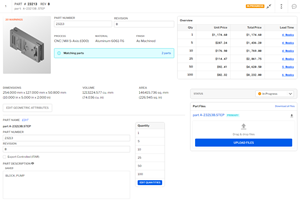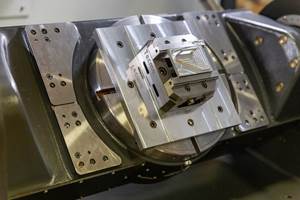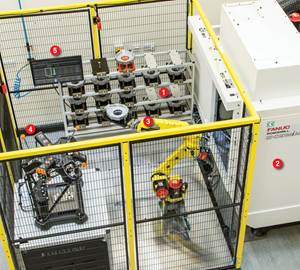How Is Digitalization Affecting the Manufacturing Supply Chain?
Leaders across the supply chain offered their thoughts during a recent panel presentation.
Share









Hwacheon Machinery America, Inc.
Featured Content
View More
Digital manufacturing promises to improve productivity on the shop floor, offering manufacturers sensors, software and connectivity to capture and leverage data about their operations. However, truly digital manufacturing extends beyond the shop floor; it follows and encompasses the entire product lifecycle.
A panel presentation at last fall’s International Manufacturing Technology Show (IMTS), hosted by Identify3D, explored how digitalization affects manufacturing across its many stages. Moderator John Barnes, founder and managing director of Barnes Group Advisors, joked in his introduction that the organizers had “assembled a supply chain” onstage, with speakers representing expertise ranging from design to materials to inspection.
The panelists were Rob Gorham, executive director of America Makes; Aaron Frankel, senior director of marketing for Siemens; Joe Inkenbrandt, founder and CEO of Identify3D; Marc Saunders, director – global solutions centers for Renishaw; and Will Herbert, director of corporate development for Carpenter Technologies. Some salient points from their conversation are summarized below:
Digitalization will enable access to untapped potential.
The problem with an analog supply chain, Mr. Frankel says, is that there’s no way to ensure that a plan was executed. With a digital supply chain, all traceability and tracking information can be readily available to confirm that the right steps were taken in the correct order.
Mr. Saunders echoed this sentiment, citing a current “gulf of information” that exists between product designer and manufacturer. Designers, he argues, need to gain knowledge about the manufacturing process and feed this back into their design strategy to improve the end products. Digital will make this possible.
Human relationships and roles will change as the result of digitalization.
While some panelists lamented the possible “death of the partnership” in a digital supply chain, others pointed out that digitalization opens new opportunities for collaboration. Mr. Frankel, for instance, brought up social media and its potential as an avenue for manufacturers to make online connections that might then become real-world relationships.
Additive manufacturing, more than any other technology, needs digital.
“Additive manufacturing is an inherently digital technology,” Mr. Saunders says. The file containing an additive part plus the data generated during the 3D-printing process itself is a digital footprint. It’s only been recently that additive manufacturers have had the ability to adequately record and analyze that data. The complexity of the process and need for optimization can benefit from digitalization.
“The digital is secondary to the physical for us, but critical,” says Mr. Herbert. (His company, Carpenter Technologies, supplies metal powders for additive manufacturing.) Human behavior, he says, is what makes the transition from digital information to physical objects; but a digital supply chain enables humans to better capture the information as parts are produced.
Data security is a top priority.
“As you move from analog to digital, you create security risks,” Mr. Inkenbrandt says. The ideal application for digitalization is to create “recipes” with precise instructions for how to make each item, but the risk is that these recipes could be tampered with or fall into the wrong hands. Mr. Inkenbrandt spoke about the concept of “digital containers” that could securely hold these recipes so that the information is only accessible under the right circumstances—perhaps when the file is opened on the right 3D printer, running the right material, under the limit for number of uses.
Digitalization begins at design, but encompasses more than that.
“Power is moving much more to design than it ever has,” Mr. Saunders says, citing designers’ need for feedback about their designs in addition to access to models and simulations to ensure that their parts will be built right the first time.
“Engineers today are not going to be just design engineers,” Mr. Frankel says. Today’s designers need to understand disciplines ranging from materials to various production technologies. Data and simulation will enable them to make the best choices for the parts at hand.
Both small and large companies have a part to play.
While large companies at the top of the supply chain are driving forward movement on digital, it’s smaller firms that frequently have the agility to make dramatic changes, Mr. Gorham says. A convergence of small and large companies with both agility and the resources to enact change will help drive the advance of digitalization.
Related Content
Give Job Shop Digitalization a Customer Focus
Implementing the integrated digital technologies and automation that enhance the customer's experience should be a priority for job shops and contract manufacturers.
Read MoreManufacturer, Integrator, Software Developer: Wolfram Manufacturing is a Triple Threat
Wolfram Manufacturing showcased its new facility, which houses its machine shop along with space for its work as a provider of its own machine monitoring software and as an integrator for Caron Engineering.
Read MoreDiving Deeper Into Machine Monitoring Data
Data visualization is the first step in using machine monitoring data, but taking it to the next level requires looking for trends within the data.
Read More5 Stages of a Closed-Loop CNC Machining Cell
Controlling variability in a closed-loop manufacturing process requires inspection data collected before, during and immediately after machining — and a means to act on that data in real time. Here’s one system that accomplishes this.
Read MoreRead Next
Registration Now Open for the Precision Machining Technology Show (PMTS) 2025
The precision machining industry’s premier event returns to Cleveland, OH, April 1-3.
Read MoreBuilding Out a Foundation for Student Machinists
Autodesk and Haas have teamed up to produce an introductory course for students that covers the basics of CAD, CAM and CNC while providing them with a portfolio part.
Read More5 Rules of Thumb for Buying CNC Machine Tools
Use these tips to carefully plan your machine tool purchases and to avoid regretting your decision later.
Read More
.jpg;width=70;height=70;mode=crop)














































